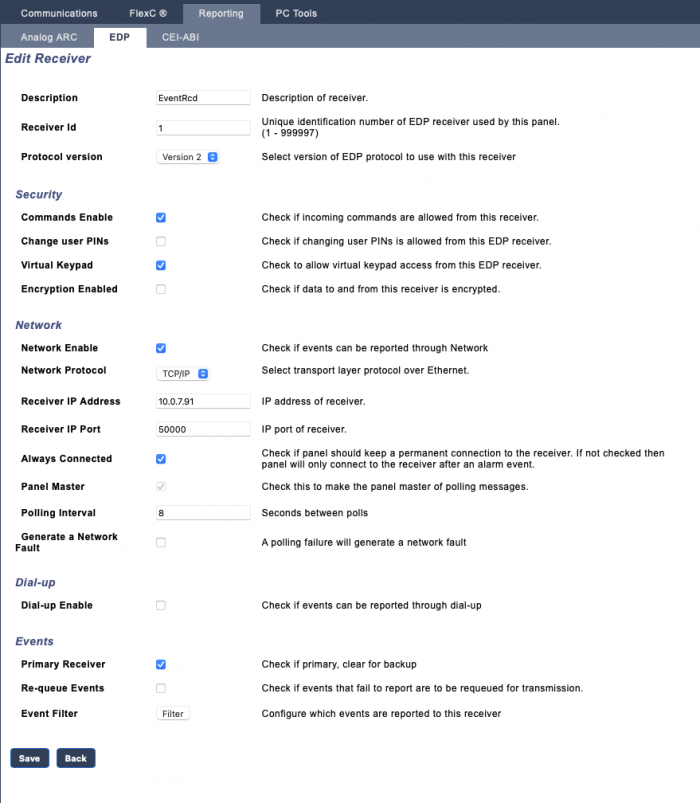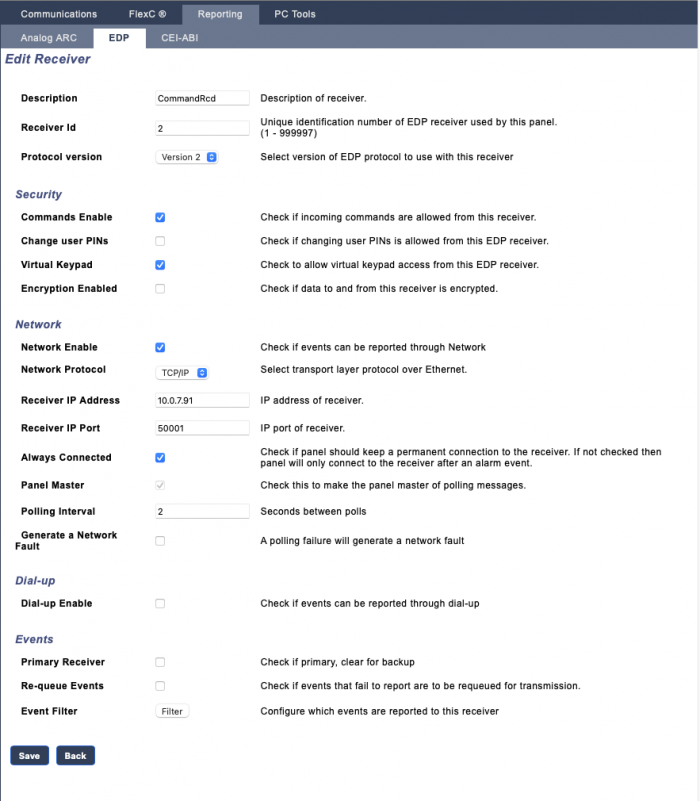Siemens Vanderbilt Edp
Siemens / Vanderbilt is a family of security panels compatible with the control protocol EDP. This driver has been developed following the EDP protocol specification rev 2.2, 2012-11-12 The integration with HSYCO can be accomplished with a TCP/IP network connection.
Contents
Siemens / Vanderbilt Configuration
Login in the panel web configuration page using a Engineer account.
You should see something like this in the upper right corner of the web page:
Select "Configuration" then "Reporting" then "EDP". You must configure 2 different receivers, one for the command session, one for the event session.
Let's take a look in detail at the configuration of these receivers. The events receiver is configured as "Primary receiver".
Unflag "Primary receiver" for the command receiver. The "IP port" parameter must be different from the one of the event receiver. Set the "Receiver Id" to 1
Flag "Always connected" on both the receivers. The "Receiver IP Address" is the IP address of the HSYCO server that you want to communicate with. Set the "Receiver Id" to 2
The "Polling Time" is a very crucial parameter. In the event receiver configuration 8-10 seconds should be fine because every change of status is sent in asynchronous way by the panel and the polling time only represent the interval between one polling ack and the next one. In the command receiver configuration set 2 seconds, this time, by empirical methods, it's the best one to ensure the connection stability.
HSYCO Configuration
Add a SIEMENS EDP TCP I/O Server in the I/O Servers section of the Settings and set its parameters:
Communication
- IP Address: Leave empty
- IP Port: Leave empty
High Availability
- Shutdown when inactive: defaults to true.
Options
| ID | Default | Values | Description |
|---|---|---|---|
| eventsport | number | the TCP/IP port specified in the event receiver of the panel | |
| commandsport | number | the TCP/IP port specified in the command receiver of the panel | |
| startupevents | false | true | generate IO events also during the driver’s start-up phase |
| false | start generating events only after HSYCO is aligned with the current status of the system | ||
| gui | true | true | enable support of the tecnoalarm Web interface object |
| false | disable support of the tecnoalarm Web interface object | ||
| debug | false | true | generates additional logs that can be viewed in verbose mode |
| false | debug logging disabled | ||
| areaslist | string | list of all the areas that are declared on the panel. Areas could not be consecutive and special characters "-" and ";" are used for intervals definition. E.G. 0-3;5-9 means areas from 0 to 3, from 5 to 9. E.G. 4;15 means area number 4 and number 15 | |
| inputslist | string | list of all the inputs that are declared on the panel. Inputs could not be consecutive and special characters "-" and ";" are used for intervals definition. E.G. 0-3;5-9 means inputs from 0 to 3, from 5 to 9. E.G. 4;15 means input number 4 and input 15 | |
| outputslist | string | list of all the outputs that are declared on the panel. Outputs could not be consecutive and special characters "-" and ";" are used for intervals definition. E.G. 0-3;5-9 means outputs from 0 to 3, from 5 to 9. E.G. 4;15 means output number 4 and output 15 | |
| doorslist | string | list of all the doors that are declared on the panel. Doors could not be consecutive and special characters "-" and ";" are used for intervals definition. E.G. 0-3;5-9 means doors from 0 to 3, from 5 to 9. E.G. 4;15 means door number 4 and door 15 | |
| troubleinputslist | string | list of all the trouble inputs that are declared on the panel. Trouble inputs could not be consecutive and special characters "-" and ";" are used for intervals definition. E.G. 0-3;5-9 means trouble inputs from 0 to 3, from 5 to 9. E.G. 4;15 means trouble input number 4 and trouble input 15 |


